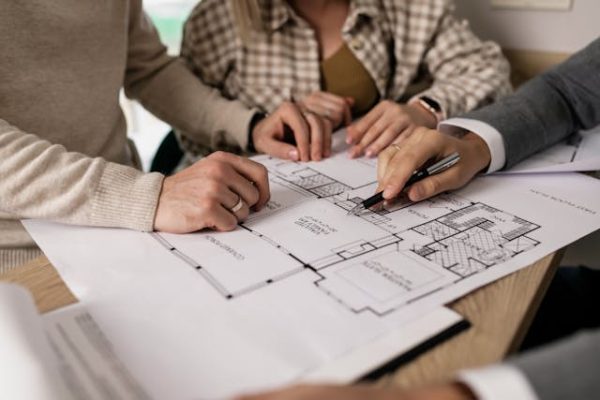Buying your first house is one of life’s most exciting milestones, but it can also feel overwhelming. From understanding your finances to picking out paint colors, there’s a lot to consider. Let’s break it down step-by-step to help you navigate this journey with ease.

Understanding Your Finances
Assessing Your Financial Situation
Before you start looking at houses, it’s crucial to have a clear understanding of your financial situation. Assess your savings, income, and current debts. This will help you determine how much you can afford to spend on a house and ensure you don’t overstretch your finances.
Creating a Budget
A detailed budget will help you manage your finances during the home-buying process. Include all potential expenses such as down payment, closing costs, moving expenses, and ongoing maintenance.
Getting Pre-Approved for a Mortgage
One of the first steps in the home-buying process is getting pre-approved for a mortgage. This involves providing your financial information to a lender, who will then tell you how much they are willing to lend you. Having a pre-approval letter shows sellers that you are a serious buyer and can give you an edge in a competitive market.
Understanding Different Mortgage Options
There are various types of mortgages available, and it’s essential to understand the differences to choose the best option for you. Common types include:
- Fixed-Rate Mortgages: Interest rate remains the same throughout the loan term.
- Adjustable-Rate Mortgages (ARMs): Interest rate can change periodically based on market conditions.
- Government-Backed Loans: FHA and VA loans offer benefits for certain buyers.
Finding the Right House
Deciding on Your Must-Haves and Nice-to-Haves
Before you start house hunting, make a list of your must-haves and nice-to-haves. Must-haves are non-negotiable features that you need in a house, such as a certain number of bedrooms or proximity to work. Nice-to-haves are features that would be nice but aren’t deal-breakers, like a large backyard or a gourmet kitchen.
Choosing the Right Location
Location is one of the most critical factors in real estate. Consider factors like the quality of local schools, proximity to work, access to public transportation, and neighborhood safety. Visiting neighborhoods at different times of the day can also give you a better sense of the area’s vibe.
Working with a Real Estate Agent
A good real estate agent can be an invaluable resource in your home-buying journey. They have access to listings, can help you navigate the buying process, and negotiate on your behalf. Make sure to choose an agent who understands your needs and has experience in the area where you want to buy.
Making an Offer
Determining a Fair Offer Price
Once you find a house you love, the next step is making an offer. Your real estate agent can help you determine a fair offer price by looking at comparable sales in the area, the condition of the house, and how long it has been on the market.
Writing the Offer
Your real estate agent will help you write a formal offer, which includes the offer price, contingencies, and the proposed closing date.
Negotiating Terms
In addition to the price, there are other terms you may need to negotiate, such as the closing date, any repairs that need to be made, and what appliances or fixtures are included in the sale. Be prepared to go back and forth with the seller until you reach an agreement that works for both parties.
Home Inspection
After your offer is accepted, it’s essential to have the home inspected by a professional. A home inspection can uncover any potential issues with the property, such as structural problems, electrical issues, or plumbing defects. Depending on the inspection results, you may need to renegotiate the terms of the sale or decide whether to proceed with the purchase.
Closing the Deal
Understanding Closing Costs
Closing costs are fees associated with finalizing your home purchase. They typically include loan origination fees, title insurance, appraisal fees, and more. Be sure to budget for these costs, which can range from 2% to 5% of the home’s purchase price.
Final Walkthrough
Before closing, you’ll have the opportunity to do a final walkthrough of the property. This is your chance to ensure that any agreed-upon repairs have been made and that the house is in the condition you expect.
Signing the Paperwork
At closing, you’ll sign a lot of paperwork to finalize the sale. This includes the mortgage agreement, the deed, and various disclosures. Make sure to review everything carefully and ask questions if anything is unclear.
Moving In
Planning Your Move
Moving into your new home can be both exciting and stressful. Start planning your move as early as possible. Decide whether you’ll hire professional movers or do it yourself. If you choose to hire movers, get quotes from multiple companies and read reviews to ensure you’re choosing a reputable service.
Packing Tips
Start packing well in advance of your moving date. Begin with items you don’t use frequently and label boxes clearly to make unpacking easier. Consider packing a “first-night” box with essentials like toiletries, a change of clothes, and basic kitchen supplies to make your first night in your new home more comfortable.
Updating Your Address and Utilities
Don’t forget to update your address with the post office, your bank, and other important institutions. Set up utilities such as electricity, water, gas, and internet in your new home before you move in.
Settling In
Once you’ve moved in, take the time to settle in and make the house your own. Change the locks for added security, set up your utilities, and start unpacking. Explore your new neighborhood, meet your neighbors, and enjoy the process of making your new house feel like home.
Decorating and Personalizing Your Space
Now comes the fun part – decorating and personalizing your new home. Whether you’re repainting the walls, hanging artwork, or buying new furniture, make your space reflect your style and preferences.
Home Maintenance and Upkeep
Regular Maintenance Tasks
Owning a home comes with ongoing maintenance tasks to keep everything in good working order. Regularly check and replace air filters, clean gutters, and inspect your roof for damage.
Seasonal Maintenance
Different seasons bring different maintenance needs. In the spring, you might need to clean your air conditioning unit, while in the winter, you should ensure your heating system is functioning correctly.
Emergency Preparedness
Be prepared for emergencies by having a basic toolkit, knowing where your home’s main shut-off valves are, and having contact information for local service providers like plumbers and electricians.
Final Thoughts
Buying your first house and moving in is a significant life event that requires careful planning and consideration. By understanding your finances, working with professionals, and being prepared for each step of the process, you can make the experience smoother and more enjoyable. Remember, this is your opportunity to create a space that reflects your personality and lifestyle, so take the time to make thoughtful decisions and enjoy the journey.

